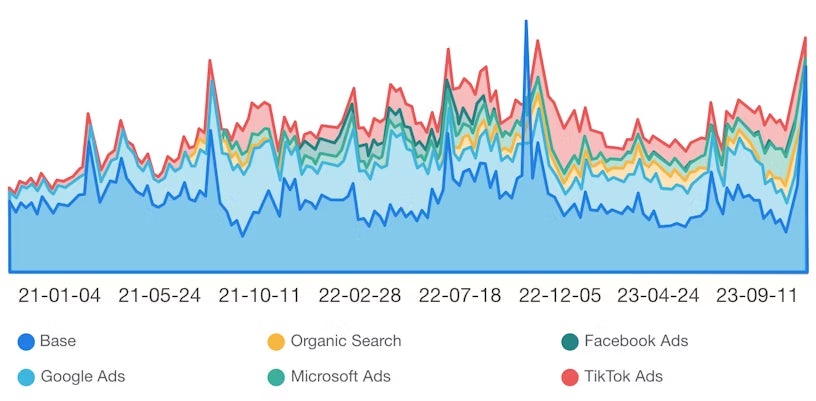In today’s data-driven marketing landscape, Marketing Mix Modelling (MMM) has emerged as a powerful tool to help marketers assess the performance of various channels and optimise their strategies accordingly.
If you are unsure of what an MMM is, we have a beginner’s guide here.
However, there are a variety of MMM vendor services, from simple AI-powered online tools to full bespoke consultative approaches. It’s essential to ask the right questions to have the correct outputs for you and your business.
In this blog post, we’ll explore critical questions you should pose to potential Marketing Mix modelling vendors to evaluate their methodologies, data usage, and overall confidence in their results. Armed with these questions, you’ll be able to identify who can provide the services you need.

1. What statistical methodologies are used?
Understanding the statistical methodologies behind MMM is crucial. Different vendors may use various techniques such as regression analysis, machine learning, or Bayesian methods. You should ask vendors to explain their chosen methodologies and why they believe these are the most appropriate for your business.
2. Can the maths behind the outputs be explained transparently?
Transparency is key when working with complex models. It’s important to understand how recommendations have been obtained so you have confidence in the results. Ensure that your vendor can clearly explain the mathematical foundations of their model.
3. How much is historical data considered?
Historical data plays a significant role in the accuracy of MMM. Providers will be able to advise about the length and scope of historical data they require for their models. Understanding this requirement will help you decide the correct approach to take.
4. What external factors are considered?
External factors have a huge effect on the results of marketing activities. A good MMM will take these factors into account in their calculations. Examples of factors to consider are; seasonality, competitor activities & general economic conditions. You should ensure that all important external variables are included in the model you choose.
5. Can the model be modified to account for external factors?
It’s also important to be able to include bespoke variables that are unique to your business. Some providers will be able to account for extra variables whereas others could be fairly rigid. You should understand whether you have a need for this and whether that affects your decision.
6. What data sources do you use?
To achieve a useful MMM you must be able to input important data to you. Ask vendors to specify the types of data sources they use, such as first-party data (your own), second-party data (partners), and third-party data (external providers). Understanding the origin and reliability of the data will help you gauge the model’s credibility and the insights it generates. Ensure that all data that affects your business can be taken into consideration.
7. How do you differentiate between activities at different stages of the marketing funnel?
Marketing activities at different stages of the funnel (awareness, consideration, conversion) can have varying impacts on your overall strategy. Ensure the model can differentiate and measure the effectiveness of activities at each stage. This distinction is vital for allocating resources effectively and optimising your marketing mix.
8. How granular are the data inputs?
The granularity of data can significantly affect the model’s precision. Ask about the level of detail the model can handle, such as daily vs. monthly data, regional vs. national data, or specific product lines vs. overall brand performance. Ensure that you are working with a model that can provide the granularity that you need.
9. Can you explain how confident you are with the results?
Confidence in model results is essential for making informed decisions. Request that vendors provide information on how they measure and communicate confidence levels, such as through confidence intervals, error margins, or validation techniques. Understanding the reliability of the model’s predictions will help you make more accurate and strategic marketing decisions.
By addressing these questions, you will be better equipped to choose a Marketing Mix Modelling vendor that meets your specific needs and helps you achieve your marketing objectives.







